Of all the spin-offs Mario has starred in over the years, the Paper Mario games (and the related Mario & Luigi series) most ably expanded the character past his basic platforming roots. The familiar characters, locations, and items are still there in Paper Mario titles, but they're supplemented by completely new settings and situations that often wouldn't feel out of place in a traditional Japanese RPG. And even the familiar Mario characters get new life in these games, revealing rich interior lives and characterizations that the simple save-the-princess-again plots can't hope to match.
Paper Mario: The Origami King continues this tradition, telling a cheesy-but-engaging, family-friendly story with verve and charm. But it messes with the series' usual RPG trappings so much that it's still finding its footing even as the final credits roll. As a complete package, Origami King often feels like a mishmash of original ideas some good, some mediocre which never quite come together as more than the sum of their parts. Paper Mario: The Origami King's conceptual gimmick is how its titular origami king, Olly, transforms the flat cutouts of the Paper Mario universe, folding them into subservient, 3D origami figures, and kidnaps Princess Peach along with her entire castle, wrapping both up in a wall of colorful streamers. So now Mario, along with Olly's repentant sister Olivia, need to flatten everything out again. The origami premise adds a nice visual flair to the already-gorgeous papercraft look of the series, and you get to see yet another take on Goombas, Shy Guys, and Koopas, even if this time they're imbued with a slightly creepy energy. Like other Paper Mario games, The Origami King is less about plot and more about throwing a joke at you at every turn, whether it's a smart turn of phrase, one-off bits that reward you for exploring its environments with a gag or item, or extended setpieces that deliver killer moments. Not every joke or bit lands, but they hit far more than they falter: a theater play that quickly takes a turn for the weird, a guessing game that has you desperately looking at a Snifit's face for any sign of emotion, an extended sequences that riffs, of all things, on The Legend of Zelda: The Wind Waker. The Origami King is consistently sharp, using both Mario characters and its interactivity to tell some great jokes.
That's been true of the Paper Mario series for a while now, but The Origami King also manages to find new life in its combat--something the series hasn't done in a while. Moving away from the limiting and resource-dependent combat of the last couple of entries, The Origami King instead has you arranging enemies on a circular, tile-based grid around Mario. Your goal is to rotate or slide the tiles on the grid to arrange enemies in lines or squares, making them easy to plow through with your jumps or hammer. Every encounter is essentially a timed puzzle with one or more "correct" solutions, and you're encouraged to solve them quickly, usually in a single turn.
Every fight requires just the right amount of involvement--not so simple that you're mashing your way through them, but not so intricate that a few fights wear you out. Even early on, when fights require just two clearly telegraphed steps to solve, the extra effort it takes to arrange enemies then time your attacks properly made me want to wade into fights rather than avoid them. As the difficulty ramps up, it's easy to become a little too obsessed with lining up every group of enemies correctly. The in-game timer (which you can spend gold to extend) adds a pressure to think quickly, which occasionally clashed with my perfectionist tendencies. I wanted to properly "solve" every encounter, and as the difficulty ramped up, I started circumventing the timer by asking Olivia for hints (which pauses the timer) or taking screenshots. It made for some fist-pumping moments where I felt like a genius just for properly stomping on random Hammer Bros, but also moments of frustrated despair when I just couldn't grok a solution after spending minutes staring at it, opting to forego the bonus gold from solving each encounter and taking some damage.
If you're not bent on solving every encounter this way, I don't blame you. Thankfully, you can pay the crowd of Toads watching your fights to make the first move for you, and later get the option to have encounters solved for you entirely. It's a great way to tweak the difficulty to your mood, even if I did end up circumventing the timer in a way that felt like cheating.
Each of these different challenges (most of which are not optional) are done well enough and definitely prevent the game from feeling predictable or rote. If anything, Origami King takes things too far in the other direction. The game is so busy experimenting with new types of gameplay that it never settles into a consistent rhythm.
New concepts are introduced and discarded so quickly that there's little in the way of orderly progression. Origami King's best gameplay ideas are gone before they can be missed or developed into something that feels more substantial than a mere tutorial. It's RPG by way of Mario Party: unable to focus on one type of gameplay for too long.
Not that there's anything necessarily wrong with that. For children or families looking for an inventive and colorful good time or a fun and friendly introduction to a whole lot of shallow gaming ideas you could do worse than Origami King. Players looking for the usual depth and progression of a full-fledged Japanese RPG, though, should look elsewhere.
The Good
Fun-filled, pun-filled writing style packs in some family-friendly pathos.
Gorgeous folded-paper worlds that feel worthwhile to explore for every secret.
Wide variety of new gameplay ideas keeps things from ever feeling stale.
The Bad
Tightly timed enemy-shifting puzzles add a lot of stress to battles.
Lack of character progression makes battles feel like unnecessary chores.
Over-abundance of mini-games prevents Origami King from developing its best ideas.
The Ugly
Spending literally three minutes staring at an enemy-shifting puzzle before giving up and buying a hint.
Verdict: Buy it for a family-friendly casual romp through a fun, colorful world. Skip if you're looking for a deep, involved RPG experience.
Paper Mario: The Origami King continues this tradition, telling a cheesy-but-engaging, family-friendly story with verve and charm. But it messes with the series' usual RPG trappings so much that it's still finding its footing even as the final credits roll. As a complete package, Origami King often feels like a mishmash of original ideas some good, some mediocre which never quite come together as more than the sum of their parts. Paper Mario: The Origami King's conceptual gimmick is how its titular origami king, Olly, transforms the flat cutouts of the Paper Mario universe, folding them into subservient, 3D origami figures, and kidnaps Princess Peach along with her entire castle, wrapping both up in a wall of colorful streamers. So now Mario, along with Olly's repentant sister Olivia, need to flatten everything out again. The origami premise adds a nice visual flair to the already-gorgeous papercraft look of the series, and you get to see yet another take on Goombas, Shy Guys, and Koopas, even if this time they're imbued with a slightly creepy energy. Like other Paper Mario games, The Origami King is less about plot and more about throwing a joke at you at every turn, whether it's a smart turn of phrase, one-off bits that reward you for exploring its environments with a gag or item, or extended setpieces that deliver killer moments. Not every joke or bit lands, but they hit far more than they falter: a theater play that quickly takes a turn for the weird, a guessing game that has you desperately looking at a Snifit's face for any sign of emotion, an extended sequences that riffs, of all things, on The Legend of Zelda: The Wind Waker. The Origami King is consistently sharp, using both Mario characters and its interactivity to tell some great jokes.
That's been true of the Paper Mario series for a while now, but The Origami King also manages to find new life in its combat--something the series hasn't done in a while. Moving away from the limiting and resource-dependent combat of the last couple of entries, The Origami King instead has you arranging enemies on a circular, tile-based grid around Mario. Your goal is to rotate or slide the tiles on the grid to arrange enemies in lines or squares, making them easy to plow through with your jumps or hammer. Every encounter is essentially a timed puzzle with one or more "correct" solutions, and you're encouraged to solve them quickly, usually in a single turn.
Every fight requires just the right amount of involvement--not so simple that you're mashing your way through them, but not so intricate that a few fights wear you out. Even early on, when fights require just two clearly telegraphed steps to solve, the extra effort it takes to arrange enemies then time your attacks properly made me want to wade into fights rather than avoid them. As the difficulty ramps up, it's easy to become a little too obsessed with lining up every group of enemies correctly. The in-game timer (which you can spend gold to extend) adds a pressure to think quickly, which occasionally clashed with my perfectionist tendencies. I wanted to properly "solve" every encounter, and as the difficulty ramped up, I started circumventing the timer by asking Olivia for hints (which pauses the timer) or taking screenshots. It made for some fist-pumping moments where I felt like a genius just for properly stomping on random Hammer Bros, but also moments of frustrated despair when I just couldn't grok a solution after spending minutes staring at it, opting to forego the bonus gold from solving each encounter and taking some damage.
If you're not bent on solving every encounter this way, I don't blame you. Thankfully, you can pay the crowd of Toads watching your fights to make the first move for you, and later get the option to have encounters solved for you entirely. It's a great way to tweak the difficulty to your mood, even if I did end up circumventing the timer in a way that felt like cheating.
Each of these different challenges (most of which are not optional) are done well enough and definitely prevent the game from feeling predictable or rote. If anything, Origami King takes things too far in the other direction. The game is so busy experimenting with new types of gameplay that it never settles into a consistent rhythm.
New concepts are introduced and discarded so quickly that there's little in the way of orderly progression. Origami King's best gameplay ideas are gone before they can be missed or developed into something that feels more substantial than a mere tutorial. It's RPG by way of Mario Party: unable to focus on one type of gameplay for too long.
Not that there's anything necessarily wrong with that. For children or families looking for an inventive and colorful good time or a fun and friendly introduction to a whole lot of shallow gaming ideas you could do worse than Origami King. Players looking for the usual depth and progression of a full-fledged Japanese RPG, though, should look elsewhere.
The Good
Fun-filled, pun-filled writing style packs in some family-friendly pathos.
Gorgeous folded-paper worlds that feel worthwhile to explore for every secret.
Wide variety of new gameplay ideas keeps things from ever feeling stale.
The Bad
Tightly timed enemy-shifting puzzles add a lot of stress to battles.
Lack of character progression makes battles feel like unnecessary chores.
Over-abundance of mini-games prevents Origami King from developing its best ideas.
The Ugly
Spending literally three minutes staring at an enemy-shifting puzzle before giving up and buying a hint.
Verdict: Buy it for a family-friendly casual romp through a fun, colorful world. Skip if you're looking for a deep, involved RPG experience.
 One Piece 1102
One Piece 1102 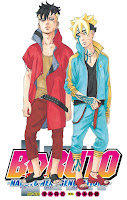 Boruto Two Blue Vortex 63
Boruto Two Blue Vortex 63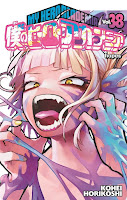 Boku no Hero Academia 409
Boku no Hero Academia 409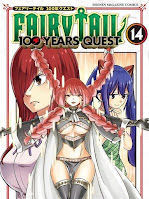 Fairy Tail 100 Years Quest 149
Fairy Tail 100 Years Quest 149 One Piece 1102 News And Spoiler
One Piece 1102 News And Spoiler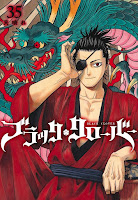 Black Clover 369
Black Clover 369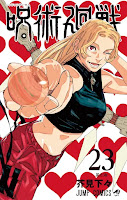 Jujutsu Kaisen 246
Jujutsu Kaisen 246